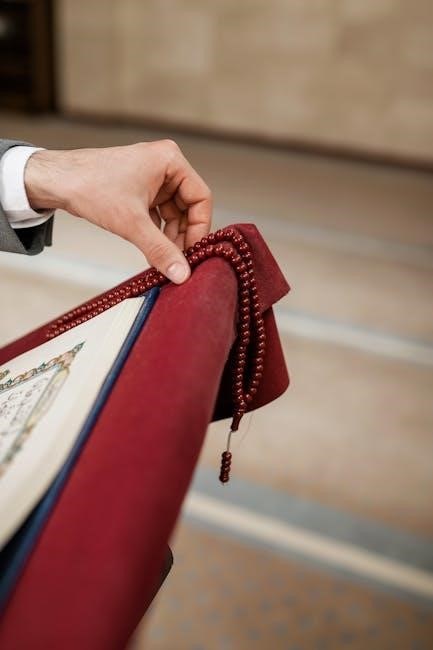Dua Ahad, a profound supplication in Islamic tradition, holds significant spiritual value. It is often recited for protection, healing, and divine guidance, emphasizing trust in Allah’s mercy and power.
Definition and Significance
Dua Ahad, a sacred Islamic supplication, signifies seeking divine mercy and protection. It is a powerful prayer often recited for spiritual growth, healing, and guidance. Originating from Islamic traditions, it emphasizes trust in Allah’s power and mercy. Regular recitation is believed to bring blessings, peace, and solace. Its significance lies in its ability to connect the believer with the Almighty, fostering a deeper sense of faith and reliance on divine will.
Historical Context
Dua Ahad traces its roots to Islamic traditions, with narrations linking it to esteemed figures like Imam Sadiq (a.s). It is believed to have been prescribed for specific spiritual benefits, including protection and divine connection. Historically, scholars emphasize its recitation during challenging times, seeking Allah’s mercy. Its origins are tied to prophetic teachings, highlighting its importance in Islamic heritage and practice.

Benefits of Reciting Dua Ahad
Reciting Dua Ahad offers numerous benefits, including spiritual growth, emotional healing, and divine protection. It strengthens one’s connection with Allah and brings inner peace.
Spiritual Growth and Purification
Reciting Dua Ahad fosters deep spiritual growth and purification. By focusing on Allah’s power and mercy, believers experience a cleansing of the heart, leading to a stronger faith. This supplication helps in seeking forgiveness and overcoming sinful tendencies, thereby drawing closer to divine guidance and enlightenment. Regular recitation enhances self-reflection and humility, essential for spiritual elevation.
Physical and Emotional Healing
Dua Ahad is a powerful supplication for physical and emotional healing. It seeks Allah’s mercy and strength to alleviate ailments and distress. Reciting it regularly can bring comfort to the heart and body, fostering emotional balance. Many believers find solace in its words, which also address spiritual wounds. This Dua is often recommended for those seeking holistic well-being, combining faith with the pursuit of health and inner peace.

How to Recite Dua Ahad Correctly
Recite Dua Ahad with purification, facing Qibla, and using a spoonful of soil from Karbala. Ensure proper Arabic pronunciation and follow the recommended etiquette for optimal blessings.
Preparation and Etiquette
To recite Dua Ahad correctly, ensure spiritual and physical purification through Wudu. Face the Qibla, maintain humility, and recite with sincere intention. Use a small amount of soil from Karbala, if available, as taught by religious leaders. Recite in a calm, melodious tone, avoiding distractions. Perform the supplication during recommended times, such as mornings or before significant events. Maintain focus and avoid interruptions to fully connect with the divine words. Consistency and respect for the prayer’s etiquette are essential for its acceptance.
Step-by-Step Recitation Guide
Begin with purification through Wudu. Face the Qibla and initiate with Bismillah. Recite the Quranic verses and specific supplications slowly, ensuring clarity. If using soil from Karbala, hold it in your hand. After recitation, silently express your needs. Conclude with Salawat upon the Prophet ﷺ. Perform the supplication with focus and sincerity, ideally during recommended times like mornings or before significant tasks. Regular recitation enhances its effectiveness and connection with divine grace.

Key Verses and Phrases in Dua Ahad
Dua Ahad contains central verses and phrases, often sourced from the Quran and Hadith, emphasizing themes of divine mercy, forgiveness, and protection. These phrases are carefully selected to deepen spiritual connection and seek Allah’s blessings effectively.
Analysis of Quranic References
Quranic references in Dua Ahad are central to its structure, drawing from verses that highlight divine mercy and guidance. For instance, the phrase Allahu Yaaa Allahu reflects a deep call to Allah, reminiscent of the Quran’s emphasis on His omnipresence. These references are woven into the supplication to strengthen the believer’s connection with Allah, ensuring the dua aligns with Islamic teachings and enhances its efficacy in seeking divine assistance and forgiveness.
Prophetic Supplications
Dua Ahad is deeply rooted in prophetic teachings, with its supplications reflecting the Prophet Muhammad’s (SAW) emphasis on seeking divine mercy. The supplication often includes phrases like Allahu Yaaa Allahu, which echo the Prophet’s own invocations. Reciting Dua Ahad for 40 mornings, as recommended by Imam Sadiq (a.s.), is believed to align one with divine guidance and mercy, embodying the Prophet’s encouragement to perform consistent, virtuous acts for spiritual growth and protection.

Tips for Acceptance of Dua
Consistency and sincerity are vital for acceptance. Recite Dua Ahad with heartfelt intent and avoid prohibited acts to ensure your supplications are answered by Allah’s will.
Consistency and Sincerity
Consistency in reciting Dua Ahad is crucial for spiritual growth. Perform it regularly with genuine intent, ensuring your heart and mind are fully engaged. Sincerity is key, as Allah accepts supplications made with true devotion. Avoid distractions and focus on the meaning of the words. Regular practice strengthens your connection with Allah, fostering a deeper sense of humility and reliance on His mercy and guidance.
Avoiding Prohibited Acts
Avoiding prohibited acts is essential for the acceptance of Dua Ahad. Engaging in sinful behavior can hinder the effectiveness of your supplications. Maintain a pure heart and sincere intention, as Allah accepts duas from those who abide by His teachings. Refrain from actions that contradict Islamic values, ensuring your deeds align with righteousness. A clean slate and adherence to divine guidelines amplify the impact of your prayers, fostering a stronger spiritual connection and increasing the likelihood of your dua being accepted;

Daily Protection Through Dua Ahad
Dua Ahad offers daily protection against spiritual and physical harm, providing a shield of divine safeguarding. Reciting it consistently strengthens your defense and ensures continuous blessings and safety.
Guarding Against Harm
Dua Ahad serves as a powerful shield against spiritual and physical harm, protecting believers from negative energies and evil thoughts. Regular recitation creates a barrier of divine safeguarding, ensuring safety and peace. It is particularly effective in warding off unseen evils and misfortunes, offering a sense of security and trust in Allah’s protection. By seeking refuge in Allah through Dua Ahad, one can navigate life’s challenges with confidence and faith, knowing they are under divine care and guardianship.
Family and Individual Safety
Dua Ahad provides divine protection for both individuals and families, creating a shield of peace and security. Reciting it regularly strengthens family bonds and fosters a sense of unity, ensuring each member feels safe under Allah’s mercy. It is a powerful means to protect loved ones from harm, offering emotional comfort and trust in divine guardianship. Through Dua Ahad, families can cultivate an environment of trust, harmony, and collective well-being under Allah’s watchful care and protection.

Morning Supplications in Dua Ahad
Morning supplications in Dua Ahad are a beautiful way to start the day. They help renew intentions, seek divine blessings, and foster mindfulness, aligning with Islamic teachings.
Renewing Intentions
Morning supplications in Dua Ahad emphasize the importance of renewing intentions. Reciting specific verses and phrases helps believers refocus on their spiritual goals and align their actions with divine will. Consistency in recitation fosters mindfulness and sincerity, key elements in strengthening one’s faith. By starting the day with Dua Ahad, individuals seek blessings, guidance, and protection, fostering a deeper connection with Allah and a purposeful life. This practice is deeply rooted in Islamic teachings and promotes inner peace and clarity.
Seeking Blessings
Dua Ahad is a powerful morning supplication to seek divine blessings and mercy. Reciting it regularly fosters a deep connection with Allah, inviting grace and prosperity into one’s life. The supplication emphasizes gratitude and humility, key qualities for attracting divine favor. By incorporating Dua Ahad into daily routines, believers can experience spiritual renewal and worldly success, as it aligns their hearts with Allah’s will. This practice is a meaningful way to begin each day, seeking blessings and guidance from the Almighty.
Salat-al-Istikhara and Guidance
Salat-al-Istikhara is a prayer for divine guidance, performed during uncertainty. It involves two rak’ahs, reciting specific verses, and supplicating for Allah’s direction, seeking clarity and wisdom in decisions.
Seeking Divine Direction
Seeking divine direction through Salat-al-Istikhara involves reciting specific Quranic verses and supplications. This prayer helps guide decision-making, ensuring alignment with Allah’s will. It fosters clarity and trust in divine wisdom, aiding believers in navigating life’s challenges with confidence and faith. Regular practice of this prayer strengthens one’s connection with Allah, providing peace and assurance in uncertain times, and is a powerful tool for seeking guidance. It is a means to attain spiritual clarity and direction.
Performing the Prayer
Salat-al-Istikhara begins with two rak’ahs of prayer, performed facing the Ka’bah. After reciting Surah Al-Fatihah, one should recite Surah Al-Kafirun in the first rak’ah and Surah Al-Ikhlas in the second. Following the prayer, the specific dua for Istikhara is recited, seeking Allah’s guidance. This prayer is ideally performed in a state of wudu and humility, ensuring sincerity and focus. Regular practice enhances its effectiveness in seeking divine direction and clarity in decision-making, fostering a deeper spiritual connection.
Dua Ahad is a powerful supplication that embodies deep spiritual connection and trust in Allah’s wisdom. Regular practice fosters inner peace, guidance, and reliance on divine mercy, enriching one’s faith journey.
Final Thoughts
Dua Ahad is a profound supplication that embodies deep spiritual connection and trust in Allah’s wisdom. Regular practice fosters inner peace, guidance, and reliance on divine mercy, enriching one’s faith journey. By reciting it consistently, believers seek protection, healing, and strength, drawing closer to Allah’s grace. Embrace Dua Ahad as a daily ritual to experience its transformative power and cultivate a heart filled with sincerity and devotion to Allah’s will.
Encouragement for Regular Practice
Embrace Dua Ahad as a daily practice to deepen your spiritual connection and seek divine mercy. Consistency in recitation fosters a sense of reliance on Allah’s will, bringing peace and clarity. By dedicating time each morning, especially for 40 days, you align with prophetic traditions and cultivate inner strength. Trust in Allah’s plan and let Dua Ahad guide you toward a meaningful and purposeful spiritual journey, enriching your life with His blessings and protection.